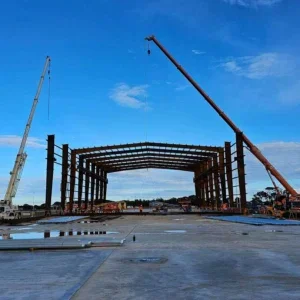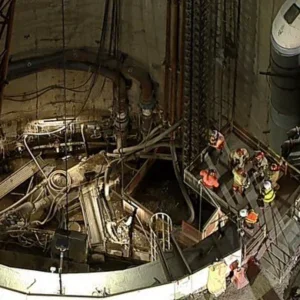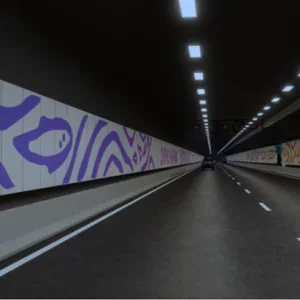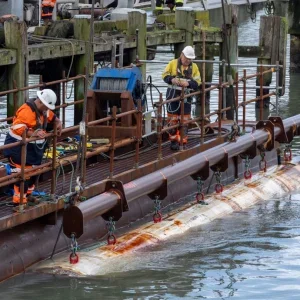Permanent stabilisation of a collapsed section of the 5.5km dual bore Thirre tunnel in Albania is currently underway after a 50m length failed in early November.
The failure happened in the centre of the unlined section of the south tunnel where permanent works had not yet been completed. Modified NATM was originally used to excavate the 12.6m diameter tunnel and the area of the collapsed section has now been backfilled to half the tunnel depth to provide load and lateral restraint to the sidewalls.
Contractor, the Bechtel-Enka JV (BEJV) has now constructed shotcrete arches around the circumference of the tunnel to increase stability either side of the collapse. “We are now grouting the rock pile and will fill any void above the collapse,” said a spokesperson for Bechtel. “The area will be re-mined through the use of a pipe roof in advance of the face of re-excavation.”
The south tunnel has been under observation since October when initial ground movement forced client Albania Ministry of Public Works, Transport and Telecommunications, General Roads Directorate to close off the unstable section, halting the fit out activities.
“The tunnel must be closed in order to allow the constructor to pursue its work to stabilize a short segment where an unstable geological mass is exerting pressure on the wall. This is an unpredicted situation,” said the Ministry in a statement in mid October. Three weeks later failure occurred with the client blaming “an unpredictable geological layer” for the collapse. It said that this layer has not affected the northern bore.
The tunnel is part of a new 171km highway that links the border with Kosovo to the Adriatic Sea. This contract is being carried out in three sections with BEJV having responsibility for the middle 60km stretch containing the tunnel.
This is the latest setback to the beleaguered project which is running a year behind schedule and has doubled in cost from €416bn (US$622bn) to €826bn (US$1.2bn). Final costs are expected to be over €1bn (US$1.5bn).
Opposition politicians from Albania’s Socialist Party have called the scheme “a misuse of the Albanian people’s money”. MPs from the party have visited the site of the collapse demanding to know what caused the failure.
Following the tunnel collapse the General Roads Directorate retained engineering experts from Austria and Germany to analyze and address technical issues in the tunnel. The experts developed the plan to address permanent stabilisation of the area which is now being implemented by BEJV. “BEJV continues implementing a rigorous program to ensure safety of all personnel involved throughout tunnel construction,” said the spokesperson.







